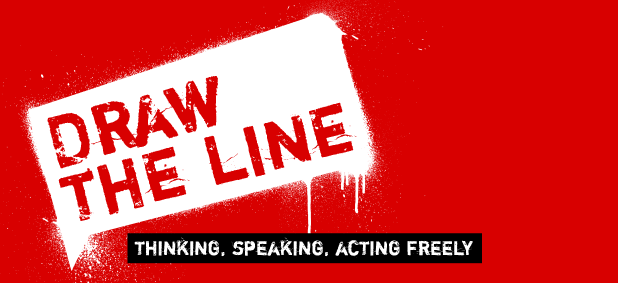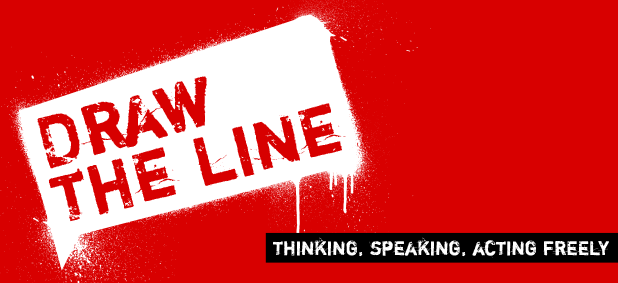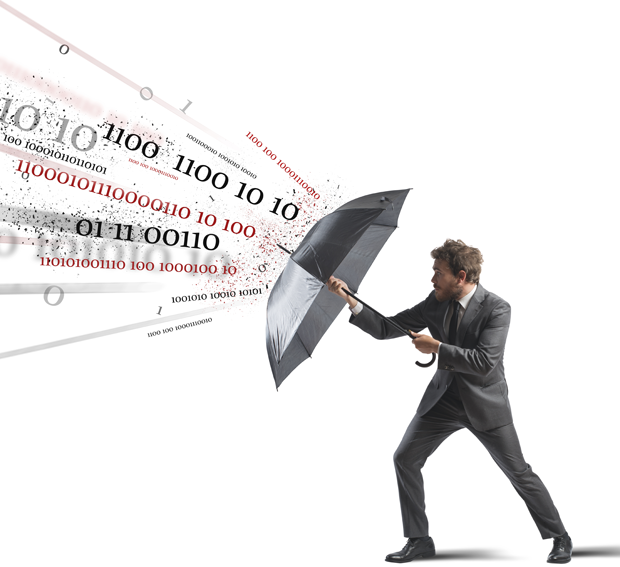12 Jan 2015 | Draw the Line, Young Writers / Artists Programme

“We want to laugh at the extremists – every extremist. They can be Muslim, Jewish, Catholic. Everyone can be religious but extremist thoughts and acts we cannot accept,” Laurent Léger, a journalist at Charlie Hebdo–a satirical magazine where an extremist attack killed 12 people on Wednesday—told BFM-TV in 2012. Some weeks ago, a violent extremist attack also killed three people in Sydney. In 2011, Anders Breivik killed 77 people in a terrorist attack in Norway. During the late 20th century, the conflict between Catholics and Protestants also claimed the lives of thousands in Northern Ireland. The list of conflicts goes on.
Religious extremism is one of the greatest challenges facing society in the 21st century. Many world conflicts are closely linked to restrictions on religious freedoms. These horrific attacks will continue until there is an understanding of how important it is for people to be free to believe and practice their religion.
Religious freedom is enshrined in Article 18 of the Universal Declaration of Human Rights. We have the right to change religion or belief. We have the right to pray in private or public. We have the right to teach about our religion, but we can only keep these rights if we do not give in to religious discrimination, such as Islamophobia, Anti-Semitism or even discrimination against atheists.
On the #IndexDrawtheLine Twitter feed, some readers emphasised the importance of institutions in countering religious extremism. @KayRobinson thinks that institutions should adopt a secular law but “hold an authentic respect for religious values.” Organisations, such as governments, have to effectively counter extremism but society also has a responsibility. We have to support the values of religious freedom, and to ensure people expressing a range of differing views and values are not silenced.
This article was published on 12 January 2015 at indexoncensorship.org
15 Dec 2014 | About Index, Draw the Line, Young Writers / Artists Programme

Religious freedom and religious radicalism which leads to extremism has become an increasingly difficult balancing act in the digital age where presenting religious superiority through fear and “terror” is possible both locally and internationally at internet speeds.
The ongoing series of beheading videos released by the Islamic State and the showcase of kidnapped school girls by Nigeria’s Boko Haram on YouTube are both examples that test the extent to which the UN Convention of Human Rights can protect religious freedoms. According to a report by the International Humanist and Ethical Union, Egypt’s Youth Ministry are targeting young atheists vocal on social media about the dangers of religion. In Saudi Arabia, Raef Badawi was sentenced to seven years in prison in 2013 and received 600 lashes for discussing other versions of Islam, besides Wahhabism, online.
Article 18 of the Convention states that the “right includes freedom to change his religion or belief, and freedom, either alone or in community with others and in public or private to manifest his religion or belief in teaching, practice, worship and observance”. The interpretation of “practice” is a grey area – especially when the idea of violence as a form of punishment can be understood differently across various cultures. Is it right to criticise societies operating under Sharia law that include amputation as punishment, ‘hadd’ offences that include theft, and stoning for committing adultery?
Religious extremism should not only be questioned under the categories of violence or social unrest. Earlier this month, religious preservation in India has led to the banning of a Bollywood film scene deemed ‘un-Islamic’ in values. The actress in question was from Pakistan, and sentenced to 26 years in prison for acting out a marriage scene depicting the Prophet Muhammad’s daughter. In Russia, the state has banned the publication of Jehovah’s Witness material as the views are considered extremist.
In an environment where religious freedom is tested under different laws and cultures, where do you draw the line on international grounds to foster positive forms of belief?
This article was posted on 15 December 2014 at indexoncensorship.org
17 Apr 2014 | Digital Freedom, News, United Kingdom

(Shutterstock)
James Brokenshire was giving an interview to the Financial Times last month about his role in the government’s online counter-extremism programme. Ministers are trying to figure out how to block content that’s illegal in the UK but hosted overseas. For a while the interview stayed on course. There was “more work to do” negotiating with internet service providers (ISPs), he said. And then, quite suddenly, he let the cat out the bag. The internet firms would have to deal with “material that may not be illegal but certainly is unsavoury”, he said.
And there it was. The sneaking suspicion of free thinkers was confirmed. The government was no longer restricting itself to censoring web content which was illegal. It was going to start censoring content which it simply didn’t like.
If you call the Home Office they will not tell you what Brokenshire meant. Does it mean “unsavoury” material will be forced onto ISP’s filtering software? They won’t say. Very probably they do not know.
There is a lack of understanding at the Home Office of what they are trying to achieve, of how one might do so, and, more fundamentally, of whether one should be trying at all.
This confusion – more of a catastrophe of muddled thinking than a conspiracy – is concealed behind a double-locked system preventing any information getting out about the censorship programme.
It is a mixture of intellectual inadequacy, populist hysteria, technological ignorance and plain old state secrets. And it could become a significant threat to free speech online.
The Home Office’s current over-excitement stems from its victory over the ISPs last year.
Ministers, from New Labour onward, have always tried to bully ISPs with legislation if they refuse to sign up to ‘voluntary agreements’. It rarely worked.
But David Cameron positioned himself differently, by starting up an anti-porn crusade. It was an extremely effective manouvre. ISPs now suddenly faced the prospect of being made to look like apologists for the sexualisation of childhood.
Or at least, that’s how it was sold. By the time Cameron had done a couple of breakfast shows, the precise subject of discussion was becoming difficult to establish. Was this about child abuse content? Or rape porn? Or ‘normal’ porn? It was increasingly hard to tell.
His technological understanding was little better. Experts warned that the filtering software was simply not at the level needed for it fulfill politicians’ requirements.
It’s an old problem, which goes back to the early days of computing: how do you get a machine to think like a person? A human can tell the difference between images of child abuse and the website of child support group Childline. But it has proved impossible, thus far, to teach a machine about context. To filters, they are identical.
MPs like filtering software because it seems like a simple solution to a complex problem. It is simple. So simple it does not exist. Once the filters went live at the start of the year, an entirely predictable series of disasters took place.
The filters went well beyond what Cameron had been talking about. Suddenly, sexual health sites had been blocked, as had domestic violence support sites, gay and lesbian sites, eating disorder sites, alcohol and smoking sites, ‘web forums’ and, most baffling of all, ‘esoteric material’. Childline, Refuge, Stonewall and the Samaritans were blocked, as was the site of Claire Perry, the Tory MP who led the call for the opt-in filtering. The software was unable to distinguish between her description of what children should be protected from and the things themselves.
At the same time, the filtering software was failing to get at the sites it was supposed to be targeting. Under-blocking was at somewhere between 5% and 35%.
Children who were supposed to be protected from pornography were now being denied advice about sexual health. People trying to escape abuse were prevented from accessing websites which could offer support.
And something else curious was happening too: A reactionary view of human sexuality was taking over. Websites which dealt with breast feeding or fine art were being blocked. The male eye was winning: impressing the sense that the only function for the naked female body was sexual.
It was a staggering failure. But Downing Street was pleased with itself, it had won. The ISPs had surrendered. The Washington Post described it as “some of the strictest curbs on pornography in the Western world” – music to Cameron’s ears. Suddenly the terms of the debate started shifting. Dido Harding, the chief executive of TalkTalk, was saying the internet needed a “social and moral framework”.
So instead of proving the death knell for government-mandated internet censorship, the opt-in system became a precursor for a more extensive ambition: banning extremism.
If targeting porn without also blocking sexual health websites was hard, countering terrorism was even more difficult. After all, the line between legitimate political debate and inciting terrorism is blurred and subjective. And that’s not even to address other pieces of problematic legislation, such as the Racial and Religious Hatred Act 2006, which bans incitement to hatred against religions.
Even trying to block what everyone agrees is extremist content is highly controversial. Anti-extremism group Quilliam and security experts at the Royal United Services Institute have warned that closing websites were people are liable to being radicalised actually hinders intelligence services.
A lot of what we know about Brits going off to fight in Syria or elsewhere comes from the fact they write it on message boards. Blocking them just reduces your ‘intelligence take’. Groups like Quilliam also use those sites to go in and engage with people, offering them a ‘counter-narrative’. Blocking the sites prevents them doing their work.
The Home Office mulled whether to add extremism – and Brokenshire’s “unsavoury content” – to something called the Internet Watch Foundation (IWF) list.
The list was supposed to be a collection of child abuse sites, which were automatically blocked via a system called Cleanfeed. But soon, criminally obscene material was added to it – a famously difficult benchmark to demonstrate in law. Then, in 2011, the Motion Picture Association started court proceedings to add a site indexing downloads of copyrighted material.
There are no safeguards to stop the list being extended to include other types of sites.
This is not an ideal system. For a start, it involves blocking material which has not been found illegal in a court of law. The Crown Prosecution Service is tasked with saying whether a site reaches the criminal threshold. This is like coming to a ruling before the start of a trial. The CPS is not an arbiter of whether something is illegal. It is an arbiter, and not always a very good one, of whether there is a realistic chance of conviction.
As the IWF admits on its website, it is looking for potentially criminal activity – content can only be confirmed to be criminal by a court of law. This is the hinterland of legality, the grey area where momentum and secrecy count for more than a judge’s ruling.
There may have been court supervision in putting in place the blocking process itself but it is not present for individual cases. Record companies are requesting sites be taken down and it is happening. The sites are only being notified afterwards, are only able to make representations afterwards. The tradional course of justice has been turned on its head.
The possibilities for mission creep are extensive. In 2008, the IWF’s director of communications claimed the organisation is opposed to censorship of legal content, but just days earlier it had blacklisting a Wikipedia article covering the Scorpions’ 1976 album Virgin Killer and an image of its original LP cover art.
Sources close to the ISPs say they were asked to take the IWF list wholesale – including pages banned due to extremism – and block them for all their customers, whether they had signed into the filtering option or not.
They’ve proved commendably reluctant, although their reticence is as much about legal challenges as a principled stance on free speech. Regardless, they seem to be insisting that universal blocking can only be carried out with a court order. Brokenshire is then left trying to get them to include it in their optional, opt-in filter.
We don’t know if he’s succeeded in that. The Home Office are resistant to giving out any information. They direct inquiries to the Department of Culture, Media and Sport or ISPs themselves, who really have no idea what’s going on. They refuse to answer any questions on Cleanfeed, saying it is a privately owned service – a fact which is technically true and entirely misleading.
It is not conspiracy. It is plain old cock up, combined with an inadequate understanding of the proper limit of their powers.
The left hand does not know what the right hand is doing. Even inside departments of the Home Office they do not know what they are trying to achieve.
The policy formation is weak and closed. The industry is not in the loop. Media inquiries are being dismissed. The technological understanding is startlingly naive.
The prospect of a clamp down on dissent is real. It would come slowly, incrementally – a cack-handed government response to technological change it does not understand.
We must be grateful for James Brokenshire. His slip ups are the best source of information we have.
This article was originally posted on 17 April 2014 at indexoncensorship.org



